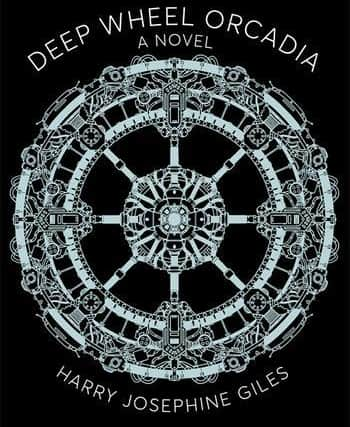Book review: Deep Wheel Orcadia, by Harry Josephine Giles


This is a bold and experimental work. The fact about experiments is that sometimes – as with the famous Michelson-Morley experiment to prove the existence of “luminiferous aether” – they fail; but you learn something from the failure. There is much to admire in Giles’ work, and much that perhaps requires more scrutiny.
What genre is this work? The front cover says “A Novel”, the spine says it is part of Picador Poetry and the back of the book says it is a “verse novel”. This has always been an ambiguous and unclassifiable type of book. There is a difference between narrative poetry, such as Tennyson’s “Idylls Of The King” and Browning’s more elaborate “The Ring And The Book” or Arthur Clough’s “Amours de Voyage”. In recent times there has been a slight resurgence in this hybrid long form: for example, Les Murray’s Fredy Neptune, Robin Robertson’s The Long Take, Anne Carson’s Autobiography of Red and Vikram Seth’s ingenious novel-in-sonnets, The Golden Gate. But there is a persistent problem. Does a line exist for itself, or is it a mechanism to propel the narrative? If you want to tell a story, do you sacrifice the intricacy of the line?
Advertisement
Hide AdDeep Wheel Orcadia does not quite square this particular circle. It is written in what the cover calls “the Orkney dialect” and the author calls “the Orkney tongue”. Each of the poems has a rendering in English beneath, and these are done with some aplomb. The idea of “translating” Scots into English, I think, begins with Robert Crawford’s joint collection with WN Herbert, Sharawaggi. It is a useful tool to clarify the distinctiveness of words. In Giles’ work, for example, the word “birl” or “birlan” is glossed as “whirlrushdancespinning”. Likewise, “unca” is put as “strangeweird” and “canny” is “skilledwisemagicalcautious”. I would think that most people with a passable grasp of Scots, in whatever form, would be able to negotiate these words swiftly. Indeed, with even more daring works, like Russell Hoban’s Ridley Walker or Anthony Burgess’s A Clockwork Orange – let alone Joyce’s Finnegans Wake – the reader is somehow lulled into the word-scape. There is a political point being made in that the “English” is beneath the “Orcadian”, but it is not really so significant when I think of my Greek and Latin Loeb classics – English verso, original recto.


The linguistic dexterity is entertaining enough. Hugh MacDiarmid gloried in and was reviled for his “synthetic Scots” and this applies here. Although the book contains its own justification – “sheu hears thir vooels roondan, thir consonants clippan / thir wirds switchan” – and often English intrudes when the vocabulary is simply not there – “Ma coseen is wi a college / roon Alpha Centauri, wirkan / wi archives o 21st century / intertextual narrative” – the problematic part is the difference between phonology and orthography. Why do these space-Orcadians say (or write) “arkaeolojist” and “ruinaetion” rather than “archaeologist” or “ruination”, “taks” for “takes” or “injines” for “engines”? I can understand the use of dwam, smirr, watergaw, on-ding, hae for have gie for give, but I’ve never known anyone insist on “crampit, caald offiece” rather than “cramped, cold office”. It may make the lilt of the language more apparent, but it can seem like difference for the sake of difference.
And it is a novel. I have a deep love of science fiction and know my onions in this area. It is not bad, but the tropes are all quite well-worn – there are hulking wrecks of unknown origin, the harvesting of “Light”, spectral presences, the loneliness of space, a degree of gender fluidity. None of this is new. Iain M Banks ticked all those boxes some time ago. Caulking the narrative with a sense of Orkney and technology, which is indubitably a valid concern, does not give a great degree of depth to the story. There is a game I play with my nephews: describe Han Solo. They can. Describe Qui-Gon Jinn. Blank faces. The characters in Deep Wheel Orcadia lack substance, and worse, the reader probably couldn’t give a fig about what happens to them. They are puppets for pyrotechnics, and last as long. Compared to works like The Hair-Carpet Weavers by Eschbach or Alice B Sheldon’s Ten Thousand Light Years From Home or Arkday and Boris Strugatsky’s stories, this feels intellectually and emotionally thin.
At the same time, I received two small books by the aforementioned Robert Crawford, Classical Texts and Brexit Tears, with artwork from Calum Colvin. These are brilliantly pared down works, reminiscent in some ways of Ian Hamilton Finlay. They are lapidary and sarcastic, enigmatic and intense. One would not think that one could read a single word – such as Penelope – arranged on the page in such a way that one would re-read it. Then re-re-read it.
Giles is undoubtedly a writer of talent, but this first major work lacks direction – it, like the space station, is spinning in a static place. Scotland and innovative science fiction has a long history, from Lindsay’s A Voyage To Arcturus to Morgan’s From Glasgow To Saturn. It is admirable to try to follow in their footsteps, braver to forge out on one’s own.
Deep Wheel Orcadia, by Harry Josephine Giles, Picador, £10.99
A message from the Editor:
Advertisement
Hide AdThank you for reading this article. We're more reliant on your support than ever as the shift in consumer habits brought about by coronavirus impacts our advertisers.
If you haven't already, please consider supporting our trusted, fact-checked journalism by taking out a digital subscription at https://www.scotsman.com/subscriptions